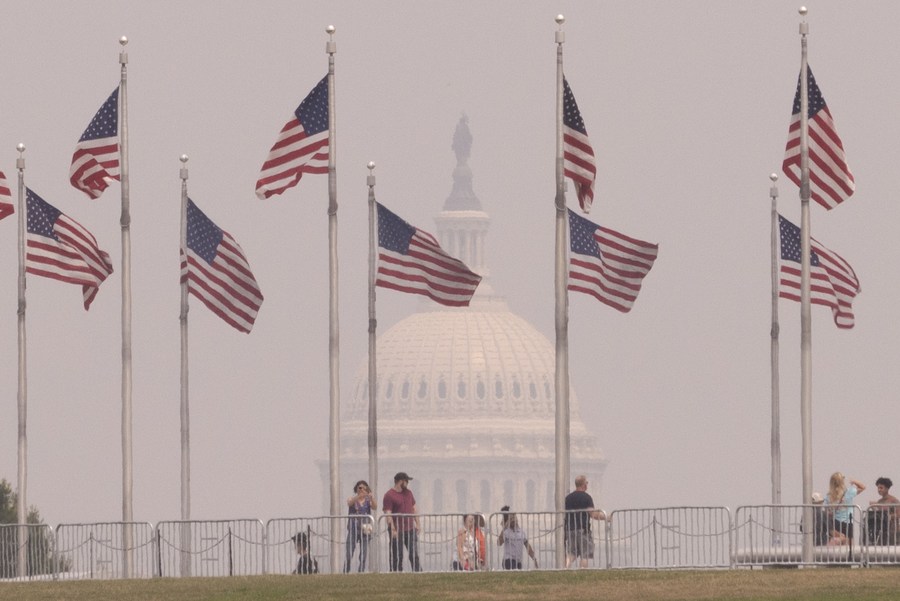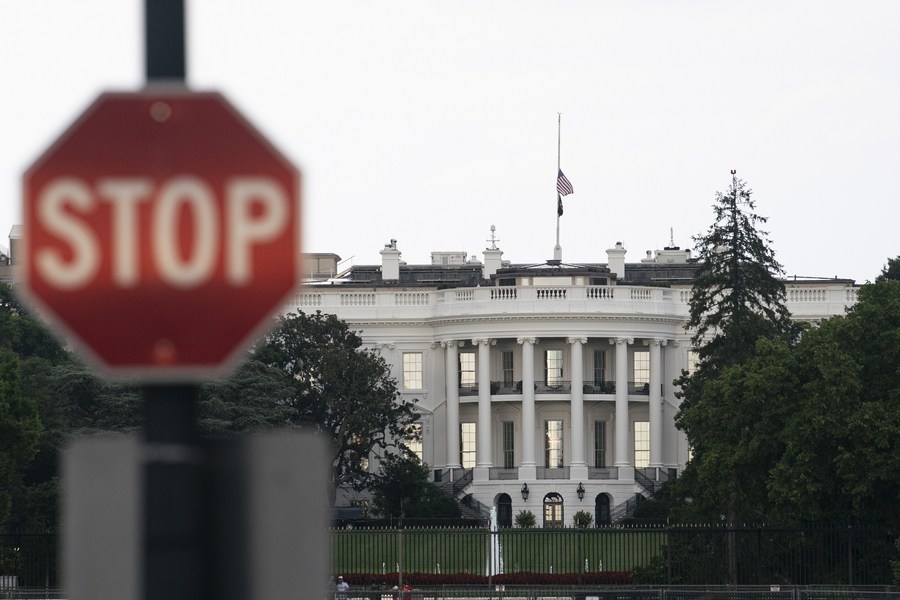

People are seen with the U.S. Capitol building shrouded in haze in the background in Washington, D.C., the United States, on June 29, 2023. (Photo by Aaron Schwartz/Xinhua)
In January 2022, the five nuclear-armed countries (China, Russia, the United States, Britain and France) issued a joint statement emphasizing the need to prevent nuclear war and avoid arms races.
While stressing that nuclear weapons should only serve defensive purposes, they reiterated the importance of non-proliferation agreements and commitments.
However, the actual U.S. policies, such as those aimed at reinforcing strategic forward-basing, strengthening space-based missile defense capabilities and transferring high-risk materials, have run counter to the spirit of the statement, which severely undermined global stability and non-proliferation efforts, causing deep concern among those who care about world peace and security.
IRRESPONSIBLE ACTIONS
Expectations were high for the Biden administration to rectify U.S. nuclear policy, as Joe Biden had emphasized during his campaign that nuclear weapons would only be used to deter nuclear attacks.
However, the 2022 Nuclear Posture Review report revealed that it continued the path set by the Trump administration, focusing on strengthening non-strategic nuclear forces and developing tactical nuclear weapons.
Under its nuclear policy, a series of irresponsible actions have significantly increased the risk of nuclear conflict.
A notable example is the Washington Declaration issued during Biden's meeting with South Korean President Yoon Suk-yeol, where they decided to establish a new nuclear consultation group and deploy nuclear submarines to the Korean Peninsula in response to the so-called "extended deterrence."
It is worth noting that this marked the first time in over 40 years that the United States deployed strategic nuclear submarines to South Korea.
At the end of 2022, the U.S. Department of Defense announced the deployment of six B-52 strategic bombers capable of carrying nuclear warheads at Royal Australian Air Force Base Tindal.
Such reinforcement of strategic nuclear forward-basing further indicates that the United States still views nuclear weapons as key elements for seeking battlefield advantage rather than solely as a last-resort deterrent measure.
In addition, the United States has been hyping up the so-called "Chinese nuclear threat" in disregard of China's commitment to the "no first use" policy, blatantly tailoring deterrence against China specifically based on its tactical nuclear weapons including the B61-12.
Framing China as a nuclear threat is nothing but a ridiculous excuse by the United States, who is trying to divert attention from its own actions and further contain China.
Moreover, the United States has been touting its Indo-Pacific strategy and creating camp confrontations in the region, coercing allies into binding their security strategies with the United States.
Coupled with its dangerous U.S. nuclear strategy, this greatly increases the risk of regional conflicts and nuclear confrontation.
 Photo taken on June 6, 2022 shows the scene of a meeting of the International Atomic Energy Agency (IAEA) Board of Governors held in Vienna, Austria. (Xinhua/Guo Chen)
Photo taken on June 6, 2022 shows the scene of a meeting of the International Atomic Energy Agency (IAEA) Board of Governors held in Vienna, Austria. (Xinhua/Guo Chen)
VIOLATE NON-PROLIFERATION
The United States will assist Australia in acquiring nuclear-powered submarines and transfer highly enriched uranium to Australia under the trilateral AUKUS alliance, which marks the first time that a nuclear weapon state help a non-nuclear weapon state gain nuclear capability.
To obviate the need of refueling and improve operational readiness, U.S. nuclear submarines are equipped with weapons-grade highly enriched uranium, which can lead to nuclear detonation once it exceeds the critical mass.
Under the AUKUS agreement in March, the United States will sell at least three nuclear submarines to Australia, and through joint cooperation, Australia aims to possess eight nuclear submarines by 2055.
This means that Australia could offload about two tons of weapons-grade highly enriched uranium from its eight nuclear submarines, equivalent to 80 nuclear warheads.
This has unprecedentedly violated the principles and practices of the Treaty on the Non-Proliferation of Nuclear Weapons, undermining the international non-proliferation regime and the International Atomic Energy Agency's (IAEA) safeguards system.
Disregarding the basic principles of the IAEA, AUKUS countries try to invoke Article 14 of the Comprehensive Safeguards Agreement to bypass verification and make safeguards exemption arrangements.
However, this approach coercively imposes arrangements without considering the divergent interpretations and applicability of Article 14 within the international community.
No countries or institutions has the right to unilaterally take the matter of the applicability of this Article or strike deals and impose them on the entire membership.
The actions of the United States, though hosting Nuclear Security Summits since 2010 for four consecutive times focused on non-proliferation, are contradictory.
By proliferating nuclear capabilities to other countries, it undermines the spirit and rules of nuclear non-proliferation.
The IAEA's verification aims to prevent any country from accumulating nuclear weapons potential, regardless of their stated intentions.
Trust is not a substitute for supervision. Using Australia's non-proliferation record as an excuse for the AUKUS, particularly by the United States, tramples on the principles of nuclear non-proliferation and violates established rules.

This photo taken on Aug. 4, 2022 shows the White House and a stop sign in Washington, D.C., the United States. (Xinhua/Liu Jie)
SHIFTING RHETORIC
The changing rhetoric of U.S. nuclear policy over the years suggests that it is struggling to maintain its dominant position in the nuclear field.
The 1999 U.S. National Missile Defense Act stipulates that the United States should deploy a limited national missile defense system. The word "limited" implies that there should be restrictions on the scale of U.S. countermeasure capability.
Even though the Bush administration withdrew from the Anti-Ballistic Missile Treaty in 2002, the United States still maintained the commitment that its homeland missile defense is not targeted at China and Russia.
However, the U.S. National Defense Authorization Act (NDAA) for Fiscal Year 2017 revised it to remove the word "limited," and the 2018 NDAA authorized expansions in the national missile defense program, which means that it overturned previous commitments to limit the size of its own capabilities of anti-ballistic missiles and not to target China and Russia.
Under the Trump administration, U.S. missile defense capabilities were directed against perceived threats from Russia and China, including the emphasis on space-based missile defense.
While emphasizing the threat from China and Russia, the Biden administration has invested heavily in so-called "The Next Generation Interceptor," including projects like Starshield utilizing advanced satellite technology by SpaceX.
The Starshield project utilizes the Starlink technology and its launch capabilities to provide "hosted payloads (the ability to put a wide variety of instruments on the Starshield satellite bus)." And the second-generation Starlink satellites weigh over one ton, making them capable of carrying interceptor payloads for multiple interceptions of ballistic missiles launched from anywhere in the world.
This has sparked concern about a potential return to an arms race reminiscent of the "Star Wars" era.
To mitigate such concerns and foster trust, the United States should take substantive actions and provide transparent and credible commitments regarding the intentions and limitations of its missile defense systems, and provide reassurances to China, Russia and other nations to dispel strategic suspicions.
By doing so, the likelihood of an arms race scenario can be reduced, and international stability can be maintained.
When all you have is a hammer, everything looks like a nail. In the eyes of a country driven by competition, everything looks like a zero-sum game. In the eyes of an arrogant nation, everything must be resolved through confrontation and conflict.
Only by upholding the common, comprehensive, cooperative and sustainable security concept and sticking to a win-win approach can we eliminate the root causes of international conflicts, improve global security governance, and bring stability and certainty to a volatile and changing era.
In the nuclear field, all nuclear-armed states should abandon Cold War mentality and zero-sum games, and adhere to the principles and norms of the Treaty on the Non-Proliferation of Nuclear Weapons. Only in this way can we effectively reduce the risk of nuclear war and any military conflicts between nuclear-armed states, and truly promote lasting peace and security worldwide.
Liu Chong is the director of Institute of International Security Studies at China Institutes of Contemporary International Relations and a council member of the China Arms Control and Disarmament Association.
The first training camp of the Center of Innovation and Maritime Excellence, supported by Chinese companies, was opened Thursday in Djibouti City, the capital o...